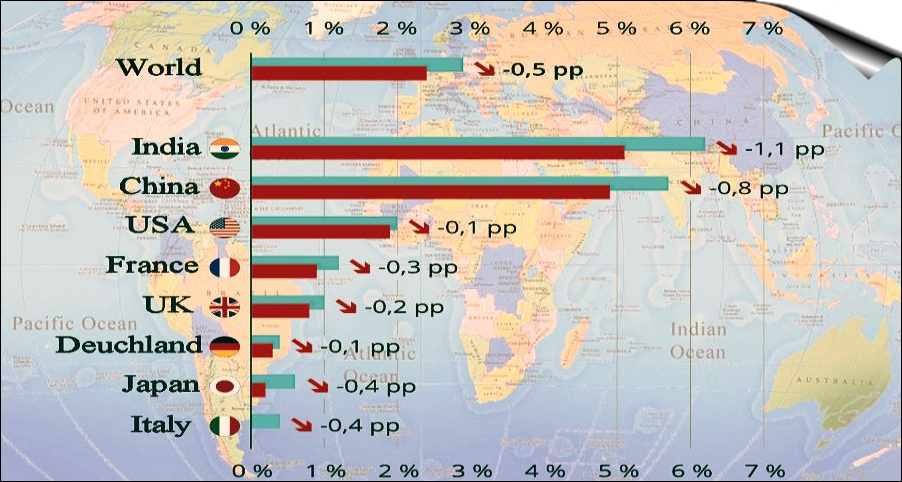CORONAVIRUS THE GLOBAL ECONOMY IS WAVING |
|
In a world hanging from the coronavirus, the economy is faltering. The world stands still as the new coronavirus spreads. Long before the outbreak of the epidemic, the International Monetary Fund (IMF) had warned that the global recovery would be "slow", "fragile" and likely to falter at the slightest risk. Since the epidemic, the IMF has already lowered its global growth forecasts for 2020, taking into account the impact on China, the second largest economy in the world. But that was before the contagion to the rest of the world. 
Covid-19 popular worldwide The coronavirus has indeed spread like wildfire. More than forty countries are now affected by the epidemic that hit the shores of Brazil, no longer sparing the South American continent. At the last count, 81,000 people were contaminated by Covid-19 which killed 2,761 people worldwide, including only 40 outside of China. The epidemic has entered a "decisive phase," said the World Health Organization (WHO). In the past two days, the daily number of new people infected worldwide has been higher than that recorded in China, where the virus first appeared in December. With 528 cases identified and 14 dead, Italy has become the epicenter of the Old Continent. No one is spared. Greece, Spain, the United Kingdom, Croatia, Austria, Denmark and Germany have at least one infected person after a stay on the peninsula. Elsewhere in Europe, many countries such as Estonia, Switzerland, Norway, the Netherlands, Romania and North Macedonia are also affected. For economists, the coronavirus could be too much “external shock”. The global economy faces its worst risk of recession since the 2008 financial crisis. "With the partial exception of black plague in 14th century Europe, every major pandemic has been followed by an economic recession," observes Professor Robert Dingwall, researcher at the University of Nottingham Trent in England. "I don't think there are any good reasons to think it would be different this time," he said. Radical measures against the coronavirus Especially since the list of radical measures to try to contain the new virus is growing every day a little more, the virus from mainland China spreading like wildfire on all continents. As of January, production plants had been shut down in China and entire cities confined. On Friday, the iconic Basel watch fair was adjourned and the Geneva motor show was canceled. Saudi Arabia has stopped welcoming pilgrims to Mecca. Uncertainty also hangs over the holding of the Tokyo Olympic Games in July. Iran prohibits people who are sick or suspected of being sick from traveling inside the country. The United States and South Korea have announced the suspension of joint military exercises. In Italy, the clash between Juventus and Inter Milan and four other matches in the championship will take place this weekend behind closed doors, confirmed the Italian Football League on Thursday. Heavy economic consequences The economic consequences are already enormous in certain sectors such as transport, luxury, tourism. Chinese travelers, usually so numerous in major European capitals, are sorely lacking. Likewise, Asian destinations are shunned by tourists. Italy (whose tourism represents 13% of the GDP) is likely to see worsening its difficulties. "We carried out a preliminary calculation which estimates that this crisis will cost at least 22 billion dollars [approximately 20 billion euros] to the sector" tourism in the world, says Gloria Guevara, president of the World Travel and Tourism Council (WTTC) in an interview with the daily newspaper "El Mundo". The shortfall could climb to 49 billion dollars (44.6 billion d 'euros) if the crisis lasted as long as that of SARS which had unfolded in six months between 2002 and 2003 and 73 billion dollars (66.5 billion euros) if it was prolonged more, according to Oxford Economics. Dependence on China The dependence on China, its huge market and its gigantic production capacities is even more visible in areas such as the automobile (certain equipment manufacturers are in great difficulty), the food industry (exports are trapped), the pharmaceutical sector. , etc. Some companies are already unemployed. "The contraction in production in China has had effects worldwide, reflecting the growing importance of China in global supply chains and in commodity markets," said the OECD. A loss of half a percentage point for global growth is based on "the assumption that the epidemic peak will be reached in China in the first quarter of 2020 and that in the other countries, the epidemic will prove to be more moderate and circumscribed", specifies the international organization based in Paris. A more sustainable epidemic, which would spread widely in Asia-Pacific, Europe and North America, could even halve global growth this year, warns the organization. Central bank concerns and contingency plans Central banks are worried. In an interview with the "Financial Times", Christine Lagarde, the president of the ECB, explains that the crisis does not require an hour of monetary response, but that the shock could last long. Its impact on the world economy could be greater than that of SARS in 2002, estimated for its part Klaas Knot the governor of the bank of the Netherlands. The stock markets all sank again on Thursday. Emergency plans are ready to be activated, notably by the International Monetary Fund, to provide financial assistance to countries that cannot cope with the epidemic. "We have rapid financing instruments, credit facilities to support countries" in the event of an epidemic or natural disasters, detailed the spokesperson of the institution, recalling the case of Ebola. But to Barry Glassner, American sociologist author of Culture of Fear, to conclude that "nations and individuals need to take their precautions, including that of countering fear, which is spreading at least as fast than the virus itself ". |
|
| Jenny Chase for DayNewsWorld | |
 |
|



